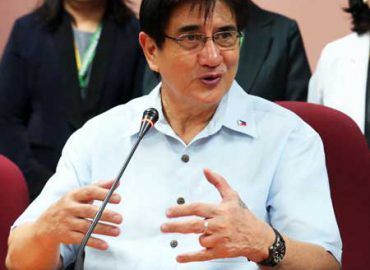.
By Leila B. Salaverria, Marlon Ramos, November 22 2018
https://newsinfo.inquirer.net/1055960/reenacted-budget-for-2019-most-likely-say-senators
Image Credit to Business World
The government is most likely to have a reenacted budget for 2019 in January even if the House of Representatives approved the P3.757-trillion general appropriations bill earlier than initially expected, according to Senate Majority Leader Juan Miguel Zubiri.
The House approved the bill on Tuesday, a week before it announced it would do so on Nov. 28, but Zubiri said the Senate would need time to scrutinize it.
Senate President Vicente Sotto III had already told the House that a meeting of the conference committee on the budget was unlikely to take place this year.
Zubiri said Speaker Gloria Macapagal-Arroyo had informed senators that the bill on the proposed national budget would be submitted to the Senate on Monday, Nov. 26.
They would have to review the measure before it could be tackled in plenary deliberations in December, when the Senate would have six session days, he said.
The majority leader said it was possible for the Senate to hold extra session days to approve the budget on third and final reading.
January ratification
Congress may hold a bicameral committee meeting during its recess, but still, the ratification of the budget could only take place in January, when sessions resume.
Sen. Francis Escudero said the Senate would try to approve the bill promptly but would not rush it if that meant compromising the quality of the work it would do.
He also sought to ease fears of a reenacted budget for a brief part of 2019. He said the expected reenactment of the budget would have little effect.
Salaries to continue
Only a few infrastructure projects would be affected, but the salaries of government personnel would continue, he said.
Lacson earlier said a reenacted budget in the past had given a sitting President wider latitude to spend the budget that was basically a huge lump sum.
Pork allocations finance pet projects of lawmakers and are a source of kickbacks.
But House Majority Leader Rolando Andaya Jr. denied that the lawmakers’ insertions delayed the expenditure bill.
Belated fund requests
Andaya said it was due to the “very unusual” belated requests of the President and Cabinet members to set aside funds for certain projects that were not in the original budget proposal.
He also said there was no pork in the appropriations bill approved by the House as it was compliant with all pertinent laws and decision of the Supreme Court.
The high court declared unconstitutional in 2013 the Priority Development Assistance Fund (PDAF), the Disbursement Acceleration Program and other discretionary funds. Its ruling came in the wake of public outrage over the misuse of the PDAF by lawmakers following a media exposé of the P10-billion pork barrel scam allegedly masterminded by businesswoman Janet Lim-Napoles.
Unspent P975 billion
The PDAF funds, meant to help the poor, went to ghost projects and the pockets of certain lawmakers.
In the House, members of the minority bloc said the Duterte administration had impounded some P975 billion in unspent public funds in its first two years in office.
The Road Board alone has accumulated P40 billion in unspent funds after the Department of Budget and Management rejected the requests of legislators, according to House Minority Leader Danilo Suarez.
“The minority is concerned that the people’s purse might be used for personal campaigns of candidates and reelectionists, instead of its true public purpose,” Suarez said.
He said he had filed a resolution summoning Budget Secretary Benjamin Diokno to face the House in a “question hour.”
“It’s time for us in Congress to look over the shoulders of those tasked with using these funds and find out how these funds are being spent,” said Senior Deputy Minority Leader Lito Atienza.
“The government is not a bank. We should not hold on to these money,” he said.

